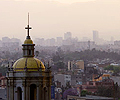Reducing greenhouse gas emissions in developing countries will be far harder than many policymakers have predicted because economic and technological disparities between rich and poor nations will be a major barrier to the adoption of efficient and renewable forms of energy, according to a new study. Researchers from the U.S.’s National Center for Atmospheric Research and the University of Colorado,
 studying data from 72 populous countries, said that economic growth, rising populations, and increased demand for goods and services in developing nations are outstripping any increases in efficiency and will continue to do so for some time. The study, published in the journal Climate Research, said that developing nations now produce 47 percent of the world’s CO2 emissions but face major challenges to reducing those emissions because of inefficient energy and transportation systems, small and outdated industrial facilities that use higher-polluting fossil fuels, and continued deforestation. Among developing nations, China is likely to far outpace India, Iran, and other countries in the adoption of renewable and energy-efficient technologies, the study says.
studying data from 72 populous countries, said that economic growth, rising populations, and increased demand for goods and services in developing nations are outstripping any increases in efficiency and will continue to do so for some time. The study, published in the journal Climate Research, said that developing nations now produce 47 percent of the world’s CO2 emissions but face major challenges to reducing those emissions because of inefficient energy and transportation systems, small and outdated industrial facilities that use higher-polluting fossil fuels, and continued deforestation. Among developing nations, China is likely to far outpace India, Iran, and other countries in the adoption of renewable and energy-efficient technologies, the study says.

UCAR
Air pollution in Mexico